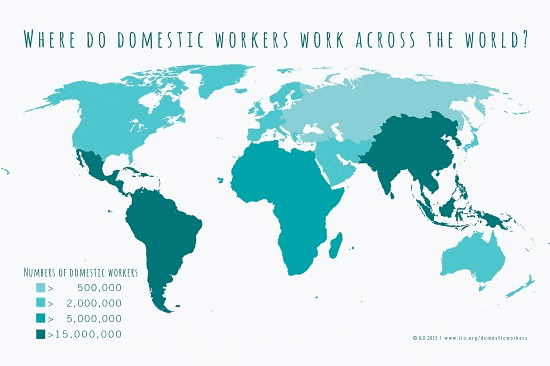Domestic workers worldwide have the same basic labour rights as other workers, including:
- Similar working hours to other workers in their respective countries.
- Weekly rest of at least 24 consecutive hours
- A limit on in-kind payment
- Clear information on the terms and conditions of employment
- Freedom of association and the right to collective bargaining.
Most countries around the world have specific legislation for this sector.
Table
| Developed Countries | Latin America and Caribbean | East Europe | Asia | Africa | Middle East | |
|---|---|---|---|---|---|---|
| Coverage by national labour legislation | Yes | Yes | Yes | Partial | Partial | Yes |
| Minimum Wage | Yes | Yes | Yes | No | Yes | No |
| In-Kind Payment of Minimum Wage | Partial | Partial | No | Domestic workers are excluded from minimum wages | Partial | Domestic workers are excluded from minimum wages |
| Maternity Leave | Partial | Yes | Partial | Partial | Yes | No |
| Maternity Cash Benefits | Partial | Yes | Partial | No | Yes | No |
| Limitation of normal weekly hours | Yes | Yes | Partial | No | Partial | No |
| Annual Leave | Yes | Yes | Partial | No | Partial | No |
| Weekly Rest | Yes | Yes | Partial | No | Partial |
In Austria for example, the Law on Home Help and Domestic Work of 1962 includes pay, working time, daily and weekly rest, holidays, notice period, and social security insurance for domestic workers.
In Italy, the Law No. 339 on Domestic Work of 1958 includes working time, weekly rest and holidays. However, this law did not treat domestic workers as equals compared to other workers in situations including maternity leave or protection from unfair dismissal. These are covered by a national collective agreement. In 2013 was approved the National Collective Labor Agreement on the discipline of domestic work to which several federations, unions and domestic work associations signed. The Contract governs the domestic employment relationship at a national level.
In Spain, an agreement entitled the “Toledo Pact” was agreed between the main political parties, employers and unions and was approved in 1955. It guarantees some rights for domestic workers as part of reforms to the social security system but was limited to employees who worked for more than 80 hours per month for the same employer. In 2006, the unions and employers reached an agreement on social security, to include the domestic workers into the general security system.
In 1982, the first legal statute for domestic workers was approved in Belgium which allowed access to unemployment benefits for full-time domestic workers yet excluded part-time workers. From 1st October 2014, all domestic workers in Belgium are entitled to social security.
In South Africa, domestic workers' rights are protected by the Constitution and labour regulations. For example the domestic worker is entitled to up to 4 consecutive months maternity leave. The dismissal of an employee for any reason related to her pregnancy is automatically viewed as unfair. However, the employer does not have to pay the employee for the period during which she is off work due to her pregnancy.
In Africa, domestic employees have similar maternity leave rights to other employees, but in Asia and the Pacific, 76.2% of workers have no rights to maternity leave. Things are even worse in the Middle East where all domestic employees have no entitlement to maternity leave.
In Argentina, the law on “Personal Household Staff” (Law 26.844) recognizes the same rights for domestic workers as those granted by that law to the rest of the wage-employees. With the passage of this regulation, the legislative emphasizes that domestic workers should be treated the same as any other worker.
Under US law, the New York Domestic Workers' Bill of Rights covers only full-time employees including immigrants, not relatives or part-time workers such as babysitters.








